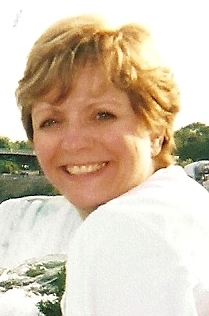ORIGINS
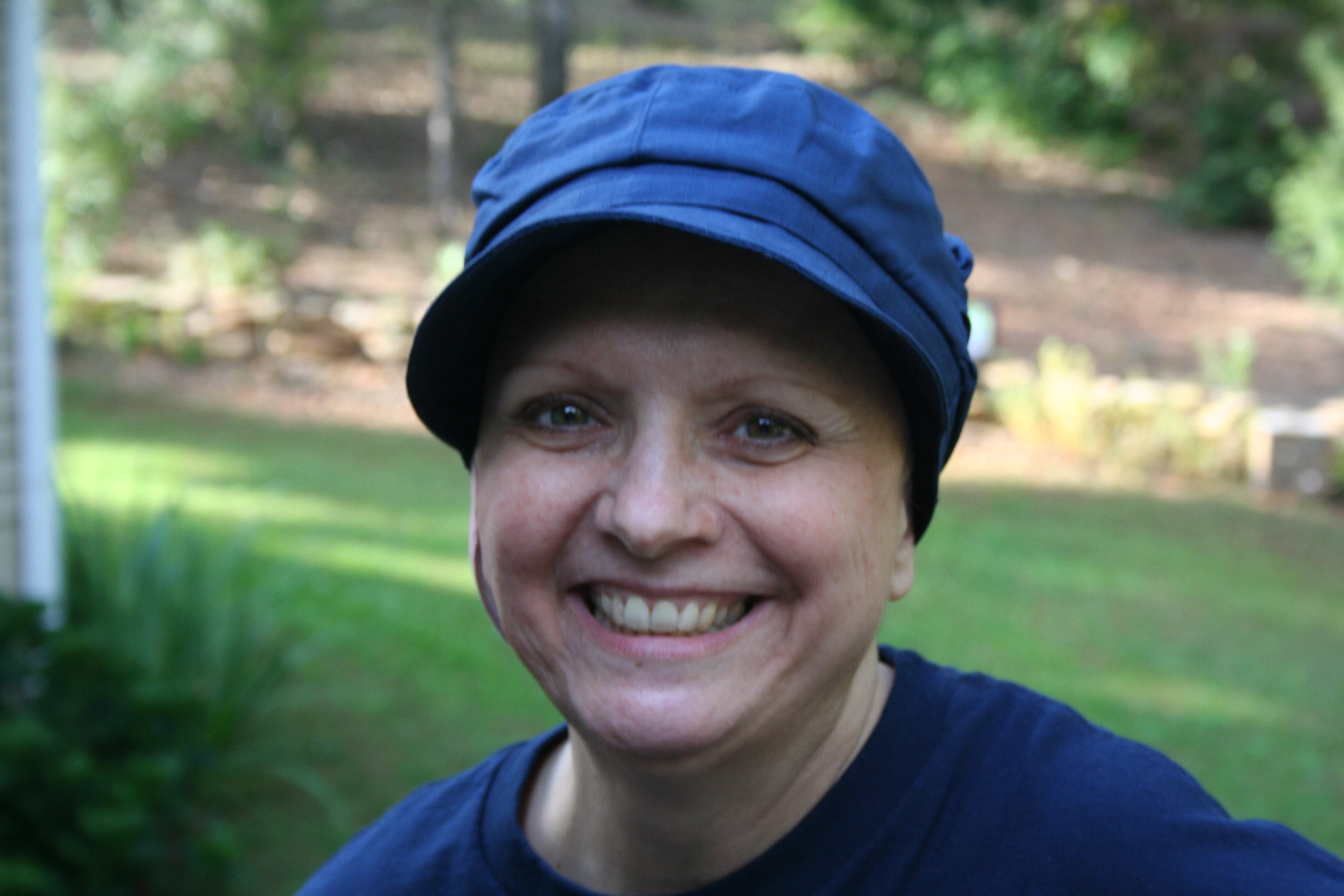 In 2009, my family received devastating news. My mom, Susan
Lacheny, was diagnosed with stage 3
angiosarcoma.
In 2009, my family received devastating news. My mom, Susan
Lacheny, was diagnosed with stage 3
angiosarcoma.Like most people, we had never heard of it and did what we could to educate ourselves. It was crushing, to see there was basically no hope for my mom, as this form of cancer is incredibly rare, and therefore, has no standard or promising treatment plan.
Sarcomas are cancers of the bone and soft tissue and are seen far more commonly in children. It's estimated that only 1% of adult cancer diagnoses will be a form of sarcoma; from there, only 1% of those will be of the subtype "angiosarcoma", cancer of the lining of the blood vessels.
At a stage 3, my mom was very much handed a death sentence. There simply wasn't enough research for this super rare cancer. Not enough was known about it, so the mortality rate was incredibly high.
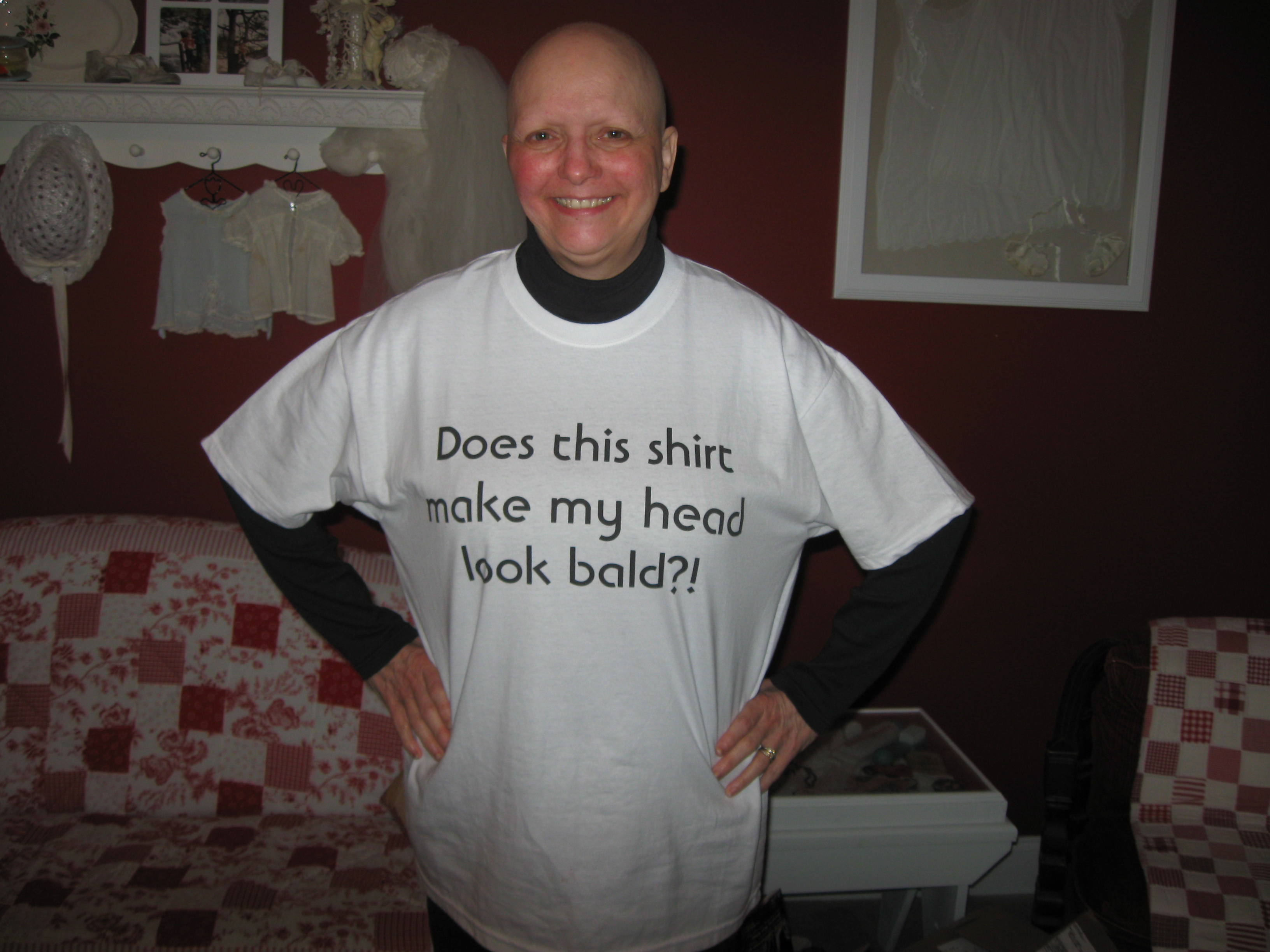 My mom's prognosis was
poor, but she understood she presented a golden opportunity
for doctors at Emory to study her. Of course she wanted to
live, but she also wanted to serve as an educational tool.
So she willingly tried any and every treatment thrown her
way, no matter how difficult or excruciating the side
effects.
My mom's prognosis was
poor, but she understood she presented a golden opportunity
for doctors at Emory to study her. Of course she wanted to
live, but she also wanted to serve as an educational tool.
So she willingly tried any and every treatment thrown her
way, no matter how difficult or excruciating the side
effects.One year after her initial diagnosis, my mom underwent a radical surgery, in an attempt to remove as much of the cancer as possible. The largest of the tumors was located on her right temple, but she had some in her ear and wrapped around her facial nerve, as well. Therefore, a large portion of the right side of her face was removed, along with her ear and affected facial nerve. A chunk of her thigh was grafted in its place, leaving her what some may call "disfigured". However, I never saw her that way--she was just my amazing, wonderful, invincible mom, and her crooked smile caused by the facial paralysis was the most beautiful I had ever seen.
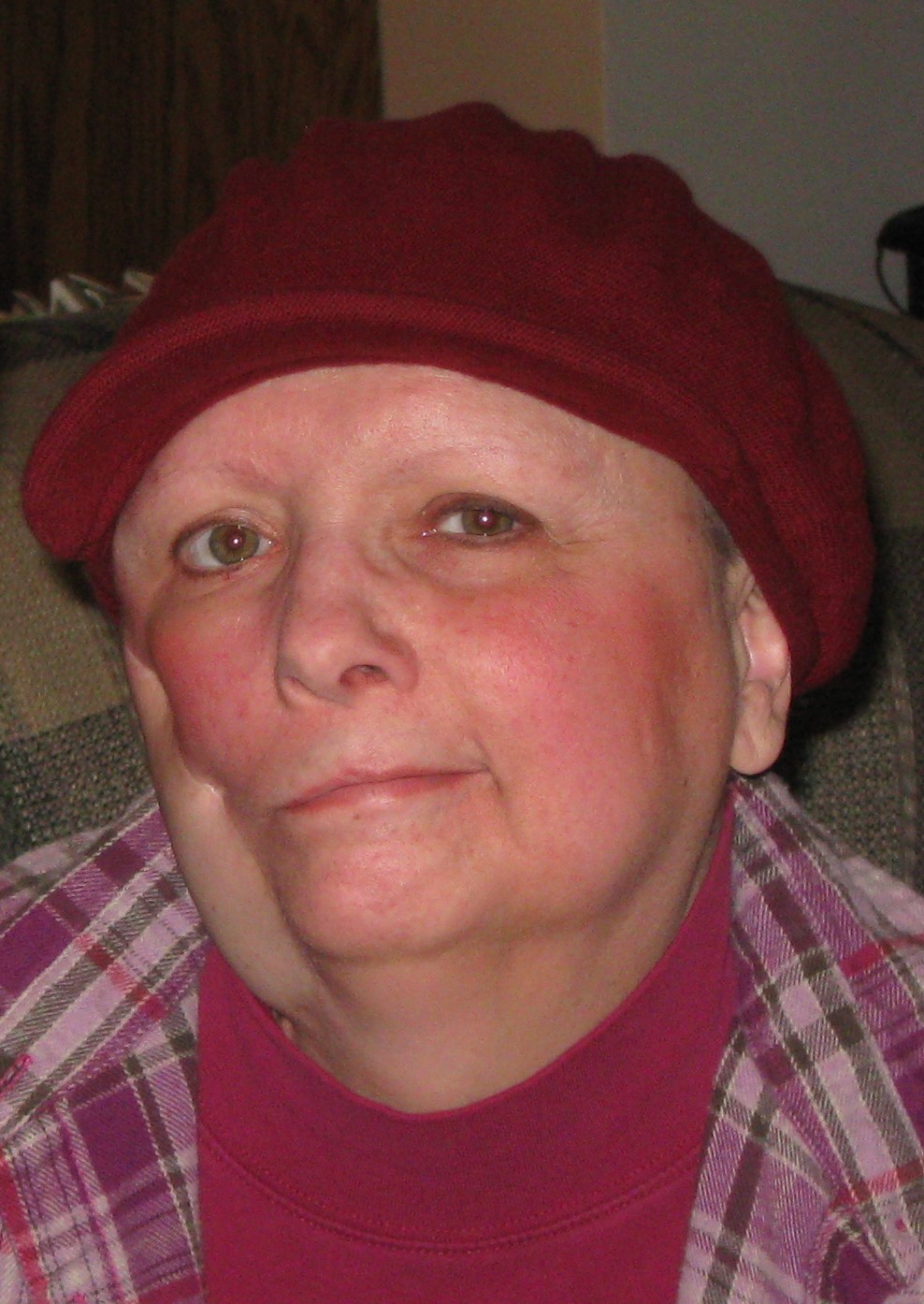 Laughter and rather inappropriate
jokes had always been our coping mechanisms in life, and her
recovery was no exception. With my mom leading the way, we
used humor to deal with the situation. Having one ear meant
she had immediate, significant hearing loss, and I became
agitated one day, when I had to repeat myself three times.
"It can't go in one ear and out the other! It has to be in
there somewhere!" I exclaimed, as she laughed hysterically
and wrote down the zinger in her notebook, where she kept
all her favorite one-liners. She also loved to approach
people, point to smooth surface on the side of her face where there was once an ear,
and remark innocently, "Hey, can you lend me an ear for a
moment?" It was this wit that made it so easy for others to
look past her unique appearance and fall in love with her
charm.
Laughter and rather inappropriate
jokes had always been our coping mechanisms in life, and her
recovery was no exception. With my mom leading the way, we
used humor to deal with the situation. Having one ear meant
she had immediate, significant hearing loss, and I became
agitated one day, when I had to repeat myself three times.
"It can't go in one ear and out the other! It has to be in
there somewhere!" I exclaimed, as she laughed hysterically
and wrote down the zinger in her notebook, where she kept
all her favorite one-liners. She also loved to approach
people, point to smooth surface on the side of her face where there was once an ear,
and remark innocently, "Hey, can you lend me an ear for a
moment?" It was this wit that made it so easy for others to
look past her unique appearance and fall in love with her
charm.Although we laughed as much as we could, the harsh reality of her condition would often rear its ugly head. One particular cocktail of chemotherapy drugs had some truly grotesque side effects, leaving her unable to do hardly anything for herself. My mom, fiercely independent, had to rely on help to do everything from brushing her teeth, to opening doors, to holding a glass of water. I recall a very notable night when I had just helped her through her nightly ritual, including slathering her hands and feet with prescription creams and covering them with cotton gloves and socks, as the skin had been falling off in large, raw chunks. We had just endured a particularly agonizing scraping of thrush from her tongue, and as she settled down, I applied her eye drops and taped her eyelid shut. Since she had no facial nerve, she was unable to close her eye naturally, so it had to be taped, with a patch covering it for added protection. She was such a pathetic sight, clearly so miserable and uncharateristically depressed. I assisted her into her bed then crawled into the spot next to her.
"Why do you do it?" I had asked. "Why do you put yourself through all of this, when you know the end result? Why not do comfort care or something, so you're not suffering like this?"
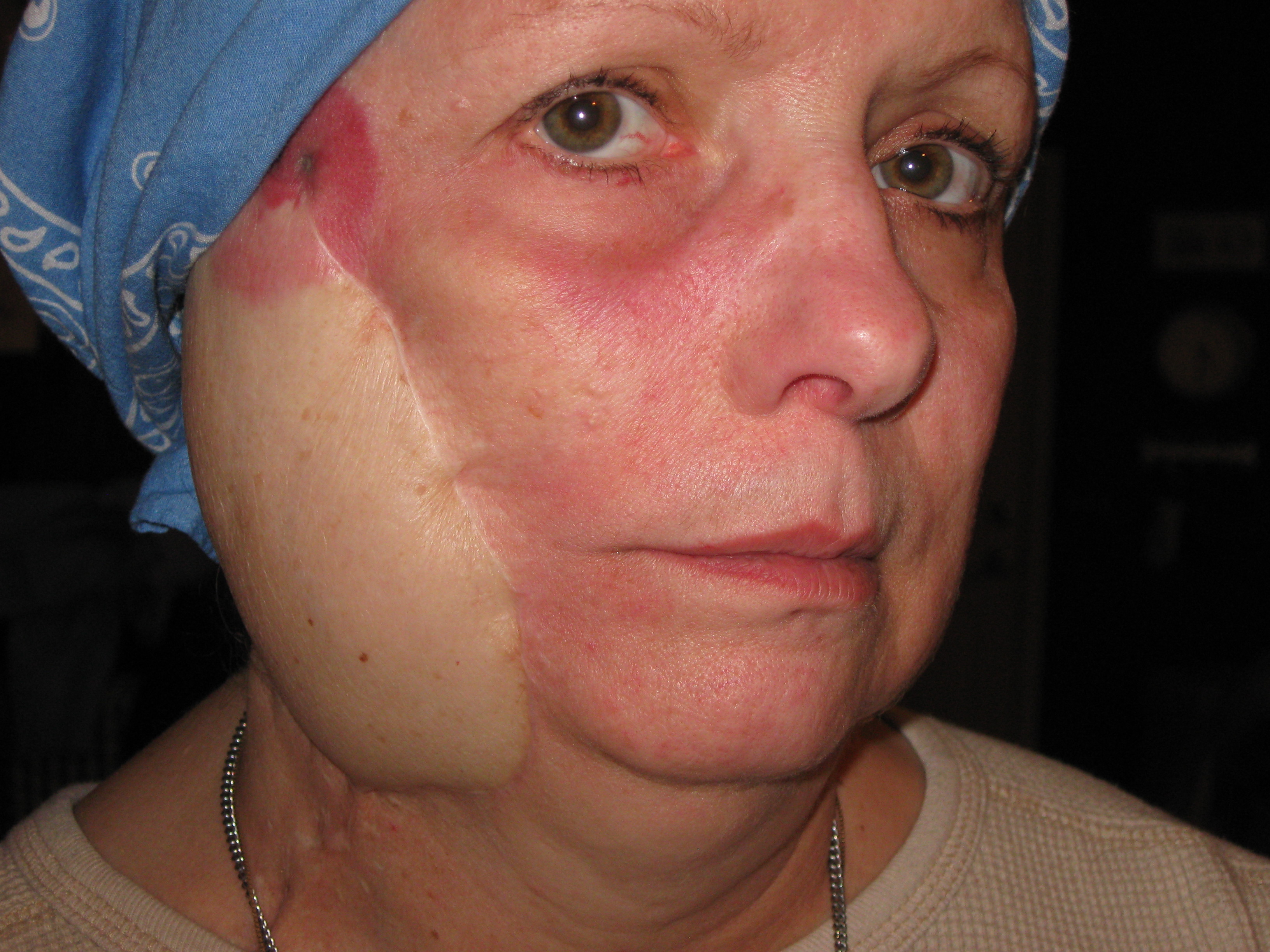 My
mom didn't hestitate and spoke the words I would never
forget: "I'm terminal," she said.
"This cancer is going to kill me. But it's also rare. It
would be a wasted opportunity, to not allow the doctors to study me. If they
try something that works, then great! But if they do
something that kills me, they know not to do that for the
next person."
My
mom didn't hestitate and spoke the words I would never
forget: "I'm terminal," she said.
"This cancer is going to kill me. But it's also rare. It
would be a wasted opportunity, to not allow the doctors to study me. If they
try something that works, then great! But if they do
something that kills me, they know not to do that for the
next person."That was the moment I realized my mom wasn't just fighting for her own life; she was fighting to give the next person to follow in her footsteps a better chance than she had. She knew she was going to die regardless, but rather than be comfortable in what limited time she had left, she instead wanted doctors to learn from her case, study her, so they could apply that knowledge to the next person to be diagnosed with angiosarcoma.
Her selflessness hit me like a slap in my face. My mom suffered, so others may not have to.
My entire perspective changed that night, and the lesson she taught me in that simple statement would go on to be the catalyst for all that I do today.
Mom would go on to surpass her prognosis by years, before she finally decided she was too tired to continue fighting. She slipped into a coma, and in October 2014--five years after her original diagnosis where she was told she had just 9-12 months to live--we removed her from life support.
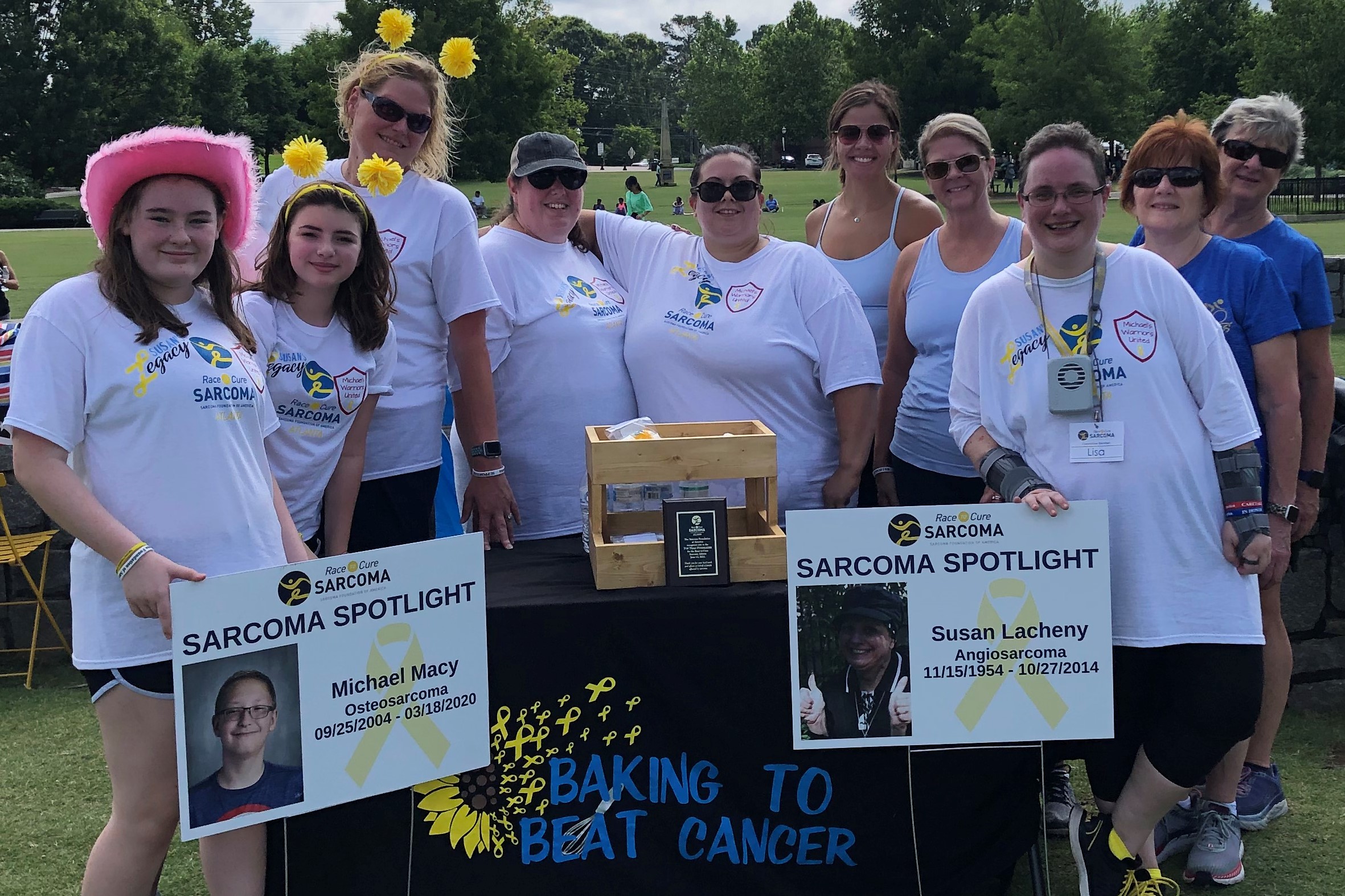 Four years later, I
joined the Sarcoma Foundation of America's "Race to Cure
Sarcoma" 5k series. It was the race's first year in Atlanta,
and I held the distinct honor of giving the very first
Opening Speech. I was thrilled to be a part of the event,
naming my team "Susan's Legacy", to continue my mom's
mission of trying to find not even a cure, realistically
speaking, but just a more promising treatment, so a late
stage sarcoma diagnosis isn't a death sentence. As the years
went by, though, I wanted a way to maximize donations for my
team. I had just developed an interest in baking and formed
"Baking to Beat Cancer". Its purpose, at the time, was to
subsidize my race donations, as well as raise awareness
in my community of what sarcoma is and why there's such
a need for research funding.
Four years later, I
joined the Sarcoma Foundation of America's "Race to Cure
Sarcoma" 5k series. It was the race's first year in Atlanta,
and I held the distinct honor of giving the very first
Opening Speech. I was thrilled to be a part of the event,
naming my team "Susan's Legacy", to continue my mom's
mission of trying to find not even a cure, realistically
speaking, but just a more promising treatment, so a late
stage sarcoma diagnosis isn't a death sentence. As the years
went by, though, I wanted a way to maximize donations for my
team. I had just developed an interest in baking and formed
"Baking to Beat Cancer". Its purpose, at the time, was to
subsidize my race donations, as well as raise awareness
in my community of what sarcoma is and why there's such
a need for research funding.Team "Susan's Legacy" would go on to not just sponsor this event, but also achieved "Top Fundraiser" status, bringing in a cumulative total of over $13,000 during my 5 years of participation, largely due to the sponsorships I received from individuals and companies that believed in what I was doing. Baking to Beat Cancer played only a small role financially, but I had succeeded in getting my name and mission out there. I was even asked to give a speech about its formation at the Sarcoma Foundation of America's online summit, encouraging others to turn their hobbies into a meaningful purpose. My ambitions had officially turned into a fully licensed home business.
However, in 2022, I felt it was time to move on, as I no longer felt the Sarcoma Foundation of America was compatible with my own morals and ambitions. I parted ways but expanded my mission to include pediatric cancers, rather than just sarcomas, largely due to the overlap. I became a regular business sponsor of The Mighty Millie Foundation, a Marietta-based registered nonprofit that provides organic popsicles to pediatric cancer centers and hospitals all over the country. These sweet, icy treats not only provide children with a sense of normalcy, but they help sooth the mouth sores that are so common with the harsh treatments. The Mighty Millie Foundation also works with other organizations, to help fund research, but it was their unique "Popsicle Project" and loss of their toddler daughter to rhabdomyosarcoma that truly inspired me. I have been incredibly happy with my relationship with the Foundation and hope to help support it for years to come.
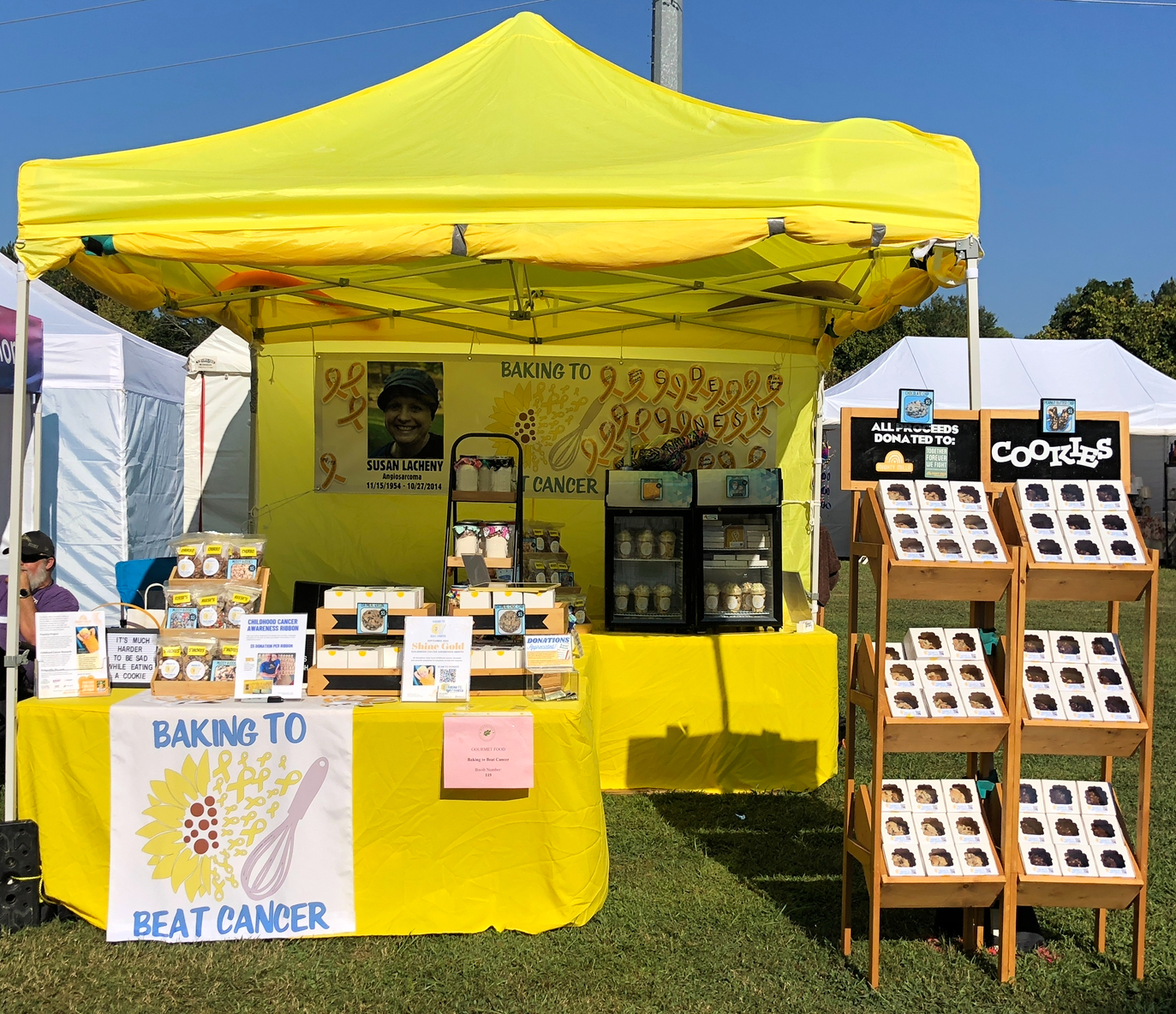 It
has been incredibly exciting, to see how my little idea
of a baking fundraiser has grown. One of the most enjoyable aspects of what I
do is definitely the people I get to meet at markets and
festivals. Because everyone
has been affected by cancer in one way or another, I very
much like to listen to customers who are willing to share their
stories. I have celebrated with those who discussed their
successes and cried with those who confided in me regarding
their losses. The meeting and subsequent loss of a local man
diagnosed with clear cell sarcoma was a particularly
difficult one to bear. But Baking to Beat Cancer is more than just a home
bakery; it is continuation of my mom's own mission. It's her
legacy, forever intertwined with mine, and a tool in which I
can go out into the community and do my part in raising
money and awareness of sarcomas and other related cancers.
It
has been incredibly exciting, to see how my little idea
of a baking fundraiser has grown. One of the most enjoyable aspects of what I
do is definitely the people I get to meet at markets and
festivals. Because everyone
has been affected by cancer in one way or another, I very
much like to listen to customers who are willing to share their
stories. I have celebrated with those who discussed their
successes and cried with those who confided in me regarding
their losses. The meeting and subsequent loss of a local man
diagnosed with clear cell sarcoma was a particularly
difficult one to bear. But Baking to Beat Cancer is more than just a home
bakery; it is continuation of my mom's own mission. It's her
legacy, forever intertwined with mine, and a tool in which I
can go out into the community and do my part in raising
money and awareness of sarcomas and other related cancers.My motto: "My part-time, tiny bakery isn't going to cure cancer. I'm not naive enough to believe anything I do will ever make an real impact . I am not going to change the world. However, I want to be able to leave that world someday, knowing I did everything I possibly could."
